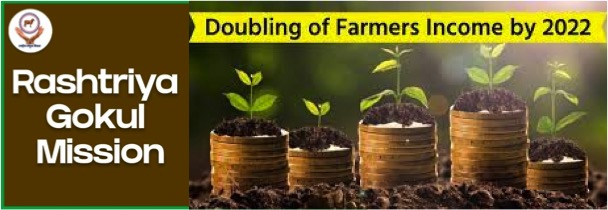Artificial insemination services have been made available at farmers’ doorsteps as part of the Nationwide Artificial Insemination (AI) Program. As of today, 3.50 billion animals have been covered, 4.33 billion artificial inseminations have been performed, and 2.28 billion farmers have benefited from the programme.
Rashtriya Gokul Mission (RGM) has been implemented by the Department of Animal Husbandry & Dairying with the goal of developing and conserving indigenous bovine breeds, and genetic upgrading of bovine populations, and increasing milk production and productivity of bovines, thereby making dairying more profitable for farmers.
The Scheme was put in place with the following goals in mind:
- Using advanced technologies to increase bovine productivity and milk production in a sustainable manner.
- To spread the use of high genetic merit bulls for breeding.
- To increase artificial insemination coverage by strengthening the breeding network and providing artificial insemination services to farmers at their homes.
- To promote indigenous cattle & buffalo rearing and conservation in a scientific and holistic manner.
The following are the scheme’s major accomplishments since its inception:
- Artificial insemination services have been made available at farmers’ doorsteps as part of the Nationwide Artificial Insemination (AI) Program. As of today, 3.50 billion animals have been covered, 4.33 billion artificial inseminations have been performed, and 2.28 billion farmers have benefited from the programme.
- So far, 14092 viable embryos of mostly indigenous breeds have been produced, 6598 viable embryos have been transferred, and 1075 calves have been born under the programme. The government has launched an Accelerated Breed Improvement programme that will use IVF technology to establish 2 lakh IVF pregnancies over the next five years. Farmers will be eligible for a subsidy of Rs 5000 per guaranteed pregnancy. Farmers now have access to bovine IVF technology.
- Sex-sorted semen production has been introduced in the country to produce only female calves with up to 90% accuracy. The use of sex-sorted semen will be a game changer not only for increasing milk production but also for reducing the number of stray cattle . Sex-sorted semen production facilities have been established at four government semen stations, and three private semen stations also have sex-sorted semen production facilities. So far, 44.37 lakh doses of sexed sperm have been produced. The government has launched an accelerated breed improvement programme using sex-sorted semen. Under the programme, 51 lakh pregnancies will be established, and farmers will be eligible for a subsidy of Rs 750, or 50% of the cost of sorted semen, on confirmed pregnancy.
- To meet the demand for high genetic merit bulls at sperm stations, the country has implemented 13 Progeny Testing (PT) and 7 Pedigree Selection programmes. Under this programme, 2401 high genetic merit bulls, primarily of indigenous breeds, were produced and inducted at sperm production stations.
- So far, 29,218 Multi-purpose Artificial Insemination Technicians in Rural Areas (MAITRIs) have been trained to deliver breeding inputs to farmers’ doorsteps.
- 16 Gokul Grams and two National Kamdhenu Breeding Centres have been established for the scientific and holistic development and conservation of Indigenous breeds



























